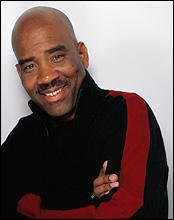 Saxophonist and singer Walter Beasley is Boston's King of Smooth Jazz.
Saxophonist and singer Walter Beasley is Boston's King of Smooth Jazz.Beasley, who plays tonight through Friday at Scullers, has taught at Berklee College of Music for more than two decades. He's also been turning out one chart-climbing r & b-tinged smooth jazz album after another during the past 10 years. The latest, ``For Her'' (Heads Up), hit No. 4 on Billboard's contemporary jazz chart last week.
Herald: What does it feel like being the main smooth jazz guy in Boston?
Beasley: It feels good and bad. I'm proud that people still come out to hear me play, and that I've established a reputation and done it from Boston. At the same time I find it frustrating that opportunities are shrinking for instrumentalists, not just in the city, but within the industry as a whole. I'm kind of disheartened because the record industry has turned its back on instrumentalists.
Herald: Has smooth jazz peaked?
Beasley: It probably has. When (Smooth Jazz) 96.9 disappeared here, it just so happened that my career was advancing. People didn't even know that things were picking up for me because we had no smooth jazz station to chronicle it. I think we're ripe for some kind of instrumental station. It doesn't have to be a smooth jazz station. We need to hear instruments.
Herald: How do you answer when someone says that you're only a smooth jazz guy and that isn't real jazz?
Beasley: I ask them to take out their horn and play and I'll take out mine and we'll play whatever they want. I'm quite proficient in traditional jazz. I love it. I come from Cannonball Adderley, Charlie Parker, Johnny Hodges, Dexter Gordon. Those saxophonists are my roots.
It just so happens that I came up in an era where Grover Washington Jr., David Sanborn and Ronnie Laws were hitting on all cylinders. I'm a product of that environment, too. When you put 'em all together, that's who I am.
I went to school with Branford Marsalis, Greg Osby and others. I can hold my own in any form of African-American music. I'm thankful for being fundamentally trained and being diverse.
Herald: And what do you say if someone raises the commercial aspect of the music?
Beasley: It doesn't really bother me. The people who invest in my records are the people who I support at this point. They help me invest in my family and in the bank where I have a mortgage.
At the same time, I can play what I want to play and teach how I want to teach.
I teach students to be not only productive and innovative, but business-savvy. It's important that they realize that this market today is very different than the one that existed in the 1950s and 1960s. We have to be capable of reinventing ourselves as instrumentalists and professional musicians.
By Bob Young Wednesday, August 10, 2005
bostonherald.com
Technorati tag: Jazz
No comments:
Post a Comment